

6 types of Socratic Questions. 35 invaluable books on Data Visualization. Are you a hard-core enthusiast of data visualization?
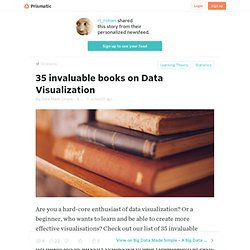
Or a beginner, who wants to learn and be able to create more effective visualisations? Check out our list of 35 invaluable books you must read for better visualization. (Some books in the list might not be directly connected to data visualization as such, but we included them because they were highly recommended by many data visualization experts. And the way books are arranged in the list has no particular order.) Data Visualization 101. The art of Data Visualization is over-rated.
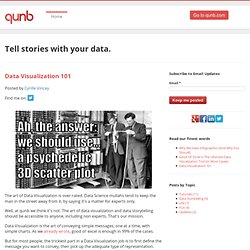
Data Science mullahs tend to keep the man in the street away from it, by saying it's a matter for experts only. Well, at qunb we think it's not. Drafts rocks with iOS Omnifocus! Over the last few posts I have been writing about how I am using Omnifocus on my iPad and iPhone.

What I have not written about is how I use other applications to drive my task capture workflow. Today's posts will detail how I capture tasks using Drafts as I document meetings that I either attend or lead. Using Drafts I am able to very quickly capture my tasks as they are identified without having to review notes and minutes later. Read on to learn more. Drafts is one of the most useful Apps in the iOS ecosystem. Simplifying interactive, realtime, and advanced analytics. Here are a few observations based on conversations I had during the just concluded Strata NYC conference.

Interactive query analysis on Hadoop remains a hot area A recent O’Reilly survey confirmed SQL is an important skill for data scientists. A year after the launch of Impala, quite a few attendees I spoke with remained interested in the progress of SQL-on-Hadoop solutions. A trio from Hortonworks gave an update on recent improvements and changes to Hive1. Transparency in big data and algorithms is not enough. Back in the old days of Web 1.0, there has been a short-lived debate on the trustworthiness of information found on websites.
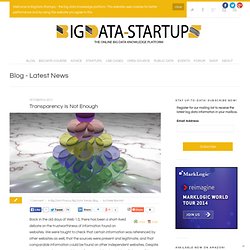
We were taught to check that certain information was referenced by other websites as well, that the sources were present and legitimate, and that comparable information could be found on other independent websites. Despite these precautions, a Dutch journalist argued that it would easily be possible to set up a group of websites with misleading information, that would all reference each other and would subtly draw a complete web of misinformation. It would be a matter of time before the information would be picked up by mainstream media and would consequently turn into ‘truth’.
Does Bigger Data Lead to Better Decisions? - Theos Evgeniou, Vibha Gaba , and Joerg Niessing. By Theos Evgeniou, Vibha Gaba and Joerg Niessing | 10:00 AM October 21, 2013 Many scholars, from decision scientists to organizational theorists, have addressed this question from different perspectives, and the answer, as for most complex questions, is “it depends.”

Why Data Artisans Are The New Data Scientists. The era of Big Data is upon us.
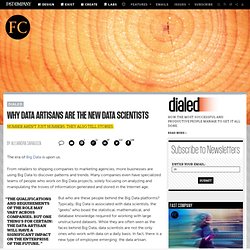
From retailers to shipping companies to marketing agencies, more businesses are using Big Data to discover patterns and trends. Many companies even have specialized teams of people who work on Big Data projects, solely focusing on analyzing and manipulating the troves of information generated and stored in the Internet age. But who are these people behind the Big Data platforms? Typically, Big Data is associated with data scientists, the “geeks” who boast the statistical, mathematical, and database knowledge required for working with large unstructured datasets. While they are often seen as the faces behind Big Data, data scientists are not the only ones who work with data on a daily basis. On Big Data, Economics, Science, and Predictions. “…many economists don’t seem troubled when they make predictions that go wrong.
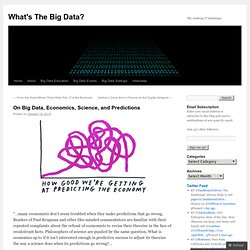
Readers of Paul Krugman and other like-minded commentators are familiar with their repeated complaints about the refusal of economists to revise their theories in the face of recalcitrant facts. Philosophers of science are puzzled by the same question. What is economics up to if it isn’t interested enough in predictive success to adjust its theories the way a science does when its predictions go wrong? … For the foreseeable future economic theory should be understood more on the model of music theory than Newtonian theory. More information might not improve your ability to make decisions. Is “Analytics for All” Finally at Hand? Business intelligence vendors have been promising to extend the power of analytics to regular business users for years.
But that promise has gone largely unfulfilled. While exact figures are difficult to come by, by most estimates BI usage rates within the enterprise stall out around 18 percent to 20 percent. The result of legacy business intelligence applications is more often frustration than actionable insights. The reasons for this lack of success are several, but follow a general lifecycle. The Embarrassment of Complexity - Helga Nowotny. Roger Martin recently diagnosed a kind of complexity that is manufactured by us and largely unaddressed: inter-domain complexity.

It comes about as fields of knowledge are segmented into multiple domains, and each domain develops deep algorithmic knowledge and specialized tools that work by ignoring many of the variables actually in play. Martin notes that the difficulty of reintegrating such simplified and divided disciplines is what gives us the feeling, when we look at any large, adaptive system, of being overwhelmed by massive, un-addressable complexity. If inter-domain complexity exists, the biggest problem it poses stems from our lack of ability to connect the real detail complexity that underlies everything, across domains. Can Your C-Suite Handle Big Data? - Brad Brown, David Court , and Paul Willmott. Over the past 30 years, most companies have added new C-level roles in response to changing business environments. The chief financial officer (CFO) role rose to prominence in the mid -1980’s as pressures for value management and more transparent investor relations gained traction.
Adding a chief marketing officer (CMO) became crucial as new channels and media raised the complexity of brand building, while Chief strategy officers (CSOs) joined top teams to help grapple with complex and fast-changing global markets. Today, as the power of data and analytics profoundly alters the business landscape, companies once again may need more top-management muscle. Capturing data-related opportunities to improve revenues, boost productivity, and create entirely new businesses puts new demands on companies — requiring not only new talent and investments in information infrastructure, but also significant changes in mind-sets and frontline training. Six top-team tasks. Can Your C-Suite Handle Big Data? - Brad Brown, David Court , and Paul Willmott.
Gaining access to the best machine-learning methods. The Promise of Big Data Still Requires a Human Touch. September 16, 2013 Posted by Jimmy Nolan Following my last post on Drowning in Data, I wanted to explore a little more on the human intervention still needed to make some aspects of data consumable for today’s emerging legion of data scientists. While a lion’s share of this information is being collected through highly automated systems and seamlessly integrated into massive searchable databases, the simple fact is that computer automation has yet to replace human judgment and assessment in every instance.
As we talked about previously, for most CIOs, access to data is not an issue – bots are constantly gathering data. The true challenge is turning this data into usable knowledge that will inform their business decisions, and that requires a level of skilled human involvement for which our business process crowdsourcing services are ideally suited. Looking at the data management lifecycle in the graphic below, the challenges of Big Data become clear. Gartner On Big Data: Everyone's Doing It, No One Knows Why - croesus.rl - Gmail. The bursting of the big data bubble. It’s been a good ride. I’m not gonna lie, it’s been a good time to be a data whiz, a quant-turned-data scientist. I get lots of attention and LinkedIn emails just for my title and my math Ph.D., and it’s flattering.
But all of that is going to change, starting now. You see, there are some serious headwinds. Gartner On Big Data: Everyone's Doing It, No One Knows Why. The gravitational pull of Big Data is now so strong that even people who haven't a clue as to what it's all about report that they're running Big Data projects. Strange, but true. According to a recent Gartner report, 64% of enterprises surveyed indicate that they're deploying or planning Big Data projects. The Future of Enterprise: Big Data. This blog is a follow up to my previous blog on The New Instability and the Future of Enterprise, and was inspired by Daniel Hulme’s General Assembly class on Big Data to Big Wisdom. There’s a lot of hype at the moment about Big Data, and how it will revolutionize the Enterprise.
As a result a lot of software vendors have jumped onto the Big Data bandwagon, re-positioning their products as Big Data to secure a place in the $6.3billion global market, expected to grow to $23.8billion by 2016. The reason for this hype is the technology to analyze and process large data sets is finally becoming commoditised through Open-Source platforms like Hadoop, and Cloud services like Amazon Web Services, that allow customers to quickly and cheaply spin up 100′s or 1000′s of virtual servers to process large data sets. So what is the hype all about? Data visualisation: Sankey or Harness? Img.en25.com/Web/DomoInc/%7B5845cabd-30b9-43d2-b12f-f2d3bbefec3a%7D_7-deadly-sins.pdf?elq_mid=682&elq_cid=600165&LeadID=00Q5000000gEyyb&ContactID= Social Media Skills for Leaders. 24 beautifully-designed web dashboards that data geeks will love.
Managing Complexity. 12 Best Presentation Tools. What great design can do for data. Business Intelligence Startup RJMetrics Raises $6.25M From Trinity Ventures For Ecommerce Boom. In the big new world of business intelligence, RJMetrics has found a market helping e-commerce companies easily analyze operations data and make smarter decisions as a result. Big startups have signed on, including Fab, Bonobos, Threadless and thousands of smaller businesses. Today, the momentum has landed the Philadelphia enterprise startup a $6.5 million first venture round led by Trinity Ventures.
SaaS BI, as online business analysis software is called within the industry, is full of competitors. Tableau Software, which is planning to IPO, along with GoodData, Domo and others have been successfully selling to big companies that need complex integrations to best analyze their own data. On the low end, Datahero and Chartio provide quick and inexpensive ways for a small business to get some quality integrations. RJMetrics has focused on what e-commerce companies need, Moore explains, although he notes that its clients range from online gaming companies to nonprofits.
GyroVoice: Six Tips for Turning Big Data into Great Customer Experiences. OracleVoice: Why Business Leaders Must Master Data And Analytics. By Rich Clayton, Vice President of Business Analytics, Oracle There’s a war on talent. The explosion of data in the digital universe is creating a skill gap and is opening up many new career opportunities in management. A recent study from McKinsey Global Institute estimates that the United States needs 1.5 million more data-savvy managers to take full advantage of big data.
Managers, not IT professionals. Leaders, not programmers. Know the Difference Between Your Data and Your Metrics - Jeff Bladt and Bob Filbin. By Jeff Bladt and Bob Filbin | 11:00 AM March 4, 2013 How many views make a YouTube video a success? How about 1.5 million? That’s how many views a video our organization, DoSomething.org, posted in 2011 got. It featured some well-known YouTube celebrities, who asked young people to donate their used sports equipment to youth in need. It was twice as popular as any video Dosomething.org had posted to date. The Value of Big Data Isn't the Data - Kristian J. Hammond.
How Marketers Must Work To Cultivate Data's Asset Value. Big data: What’s your plan? The Case for Crafting a Big Data Plan - David Court. 4 Steps to Turning Big Data into Business Impact. Making data analytics work: Three key challenges. Turning Big Data Into Smart Data: 5 Lessons For Marketers From The Obama Campaign.